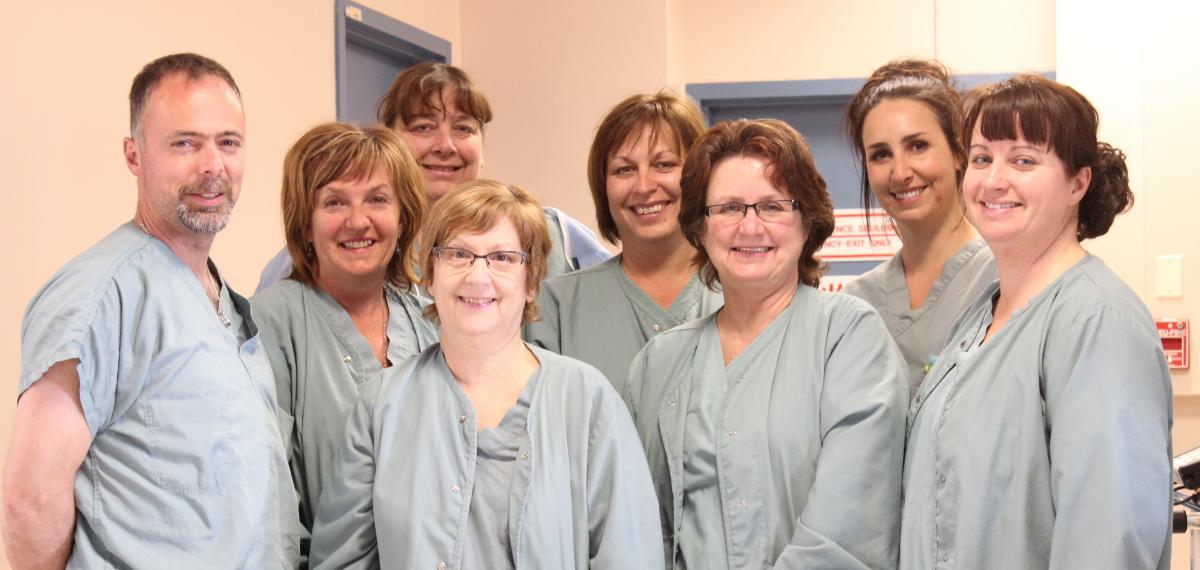A changing tide at the Lachine Hospital

The atmosphere in the operating room (OR) at the Lachine Hospital of the McGill University Health Centre (LH-MUHC) has been harmonious lately; clinical staff work with enthusiasm and good humour. The pleasant work environment is the result of a series of administrative changes as Julie Marcil, interim nurse manager of the OR explains.
“At the moment, the day-to-day atmosphere is excellent! But not so long ago, our surgeons, nurses and patient attendants (PABs) weren’t as happy,” she says. ”An inadequate capacity to replace nurses led to an added workload and difficulty in respecting coffee and meal breaks, which resulted in interruptions between operations and delays or cancellations at the end of the day.”
Julie says the work structure of the PABs was also problematic.
“There was a staff shortage and replacements were made at the last minute or not at all. The PABs were often squeezed for time and felt rushed by the nurses, who didn’t call them by their names, but by their job titles to get help because they didn’t know which PAB to call. Over time, these issues had a negative impact on the day-to-day atmosphere.”
The tide began to change in January during a meeting between Chantale Bourdeau, interim associate director of Nursing, Dr. Serge Carrier, urologist and Surgical Site director, and the clinical team. The purpose of the meeting was to mark Julie’s arrival in her position and announce the establishment of an ad hoc committee made up of clinical and administrative staff to review OR practices.
“They wanted to point out that the individual performance of each member of the team was not in question. But in order to improve the performance of the OR and meet operational targets, some changes had to be made. They said that the approach would be participatory and done with respect,” says Julie. “After the meeting, people were full of hope.”
A successful approach
The committee identified possible solutions aligned with the needs of the entire team. The first pilot project, which consisted of assigning each PAB to one operating room, worked “right away,” says Julie.
“In the space of a few days, we noticed that nurses called less often for help. The PABs prepared and brought the patients to the operating room more quickly because they could better plan their activities during the day. For their part, the nurses knew whom to contact depending on the room and were able to call the PABs by their names.”
Other relatively simple changes followed. For example, in order to eliminate the shift from 1 p.m. to 9 p.m. and reduce overtime, the committee changed the planning of surgical procedures, giving priority to day-surgery patients and then operating on inpatients. At the end of the day, fewer patients remained at the OR. As Surgeon and Ophthalmologist Dr. Manuel Perrier says, “everything has been working better, much better since the changes were made to the OR.”
“The attitude of the staff, their job satisfaction, their enthusiasm and their overall mood, everything improved, which had positive repercussions on their work, their approach to patients, their efficiency and their effectiveness. In other words, it’s been 100 per cent positive,” he notes.
For Nurse Benoit Caron, the involvement of employees in the decisions made all the difference.
“People felt more listened to, and the changes contributed to improving working conditions and patient service,” he says. “I think we should keep going in the same direction.”
After administrative changes, a new committee will review clinical services, first in day surgery and then in the preoperative clinic. Julie Marcil is confident.
“Everyone took part in the effort with extraordinary results, and now the team is enthusiastic and flexible,” she says. “I think we’re ready to meet new challenges. What we have learned in the last few months will certainly contribute to the redevelopment of the Lachine Hospital."
